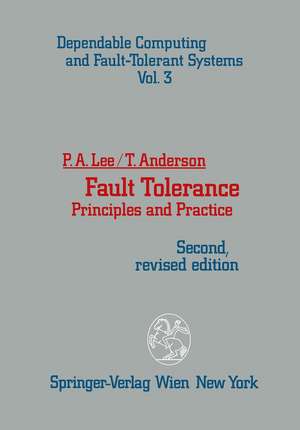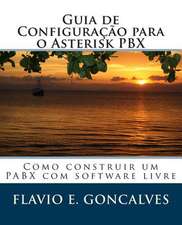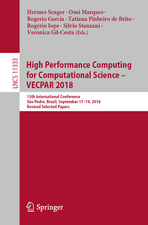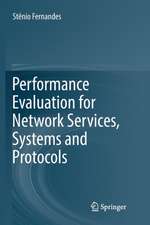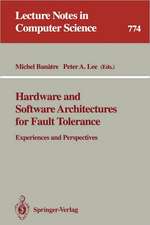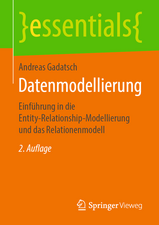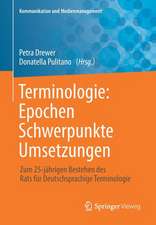Fault Tolerance: Principles and Practice: Dependable Computing and Fault-Tolerant Systems, cartea 3
Autor Peter A. Lee, Thomas Andersonen Limba Engleză Paperback – 7 ian 2012
Preț: 336.86 lei
Preț vechi: 421.08 lei
-20% Nou
Puncte Express: 505
Preț estimativ în valută:
64.48€ • 70.06$ • 54.20£
64.48€ • 70.06$ • 54.20£
Carte tipărită la comandă
Livrare economică 21 aprilie-05 mai
Preluare comenzi: 021 569.72.76
Specificații
ISBN-13: 9783709189924
ISBN-10: 3709189926
Pagini: 320
Ilustrații: XV, 320 p.
Dimensiuni: 170 x 244 x 22 mm
Greutate: 0.54 kg
Ediția:2nd ed. 1990. Softcover reprint of the original 2nd ed. 1990
Editura: SPRINGER VIENNA
Colecția Springer
Seria Dependable Computing and Fault-Tolerant Systems
Locul publicării:Vienna, Austria
ISBN-10: 3709189926
Pagini: 320
Ilustrații: XV, 320 p.
Dimensiuni: 170 x 244 x 22 mm
Greutate: 0.54 kg
Ediția:2nd ed. 1990. Softcover reprint of the original 2nd ed. 1990
Editura: SPRINGER VIENNA
Colecția Springer
Seria Dependable Computing and Fault-Tolerant Systems
Locul publicării:Vienna, Austria
Public țintă
ResearchCuprins
1 Introduction.- Fault Prevention and Fault Tolerance.- Anticipated and Unanticipated Faults.- Book Aim.- References.- 2 System Structure and Dependability.- System Structure.- System Dependability and Reliability.- Summary.- References.- 3 Fault Tolerance.- Fault Tolerance: How.- Fault Tolerance: Where and How Much.- An Implementation Framework.- References.- 4 Fault Tolerant Systems.- ESS No. lA.- SIFT and Ftmp.- Tandem.- Stratus.- References.- 5 Error Detection.- Measures for Error Detection.- Mechanisms for Error Detection.- Structuring Error Detection in Systems.- References.- 6 Damage Confinement and Assessment.- Damage Confinement.- Measures for Damage Confinement.- Measures for Damage Assessment.- Mechanisms for Damage Confinement.- Mechanisms for Damage Assessment.- Summary.- References.- 7 Error Recovery.- Concepts of Error Recovery.- Measures for Forward Error Recovery.- Backward Error Recovery.- Recovery in Concurrent Systems.- Recovery in Idealised Fault Tolerant Components.- Summary.- References.- 8 Fault Treatment and Continued Service.- Fault Location.- System Repair.- Resuming Normal Service.- Idealised Fault Tolerant Components.- Summary.- References.- 9 Software Fault Tolerance.- The Recovery Block Scheme.- The N-Version Programming Scheme.- Summary.- References.- 10 Conclusion.- Methodology and Framework for Fault Tolerance.- The Future.- References.- References.- Annotated Bibliography.- Multiple Sources.- Fault Tolerant Systems.- August Systems.- COMTRAC.- COPRA.- C.vmp.- ESS Systems (Bell Laboratories).- Fault Tolerant Multiprocessor (FTMP).- Fault Tolerant Spaceborne Computer (FTSC).- IBM 9020.- JPL-STAR Computer.- MARS.- Plessey System 250.- Pluribus.- PRIME.- Sequoia.- Software Implemented Fault Tolerance (SIFT).- Space Shuttle Computer Complex.- Stratus.- Tandem.- VOTRICS.- Software Fault Tolerance.- Multiple Source.- Recovery Blocks.- N-Version Programming.- Other Software Fault Tolerance Papers.- Exception Handling.
